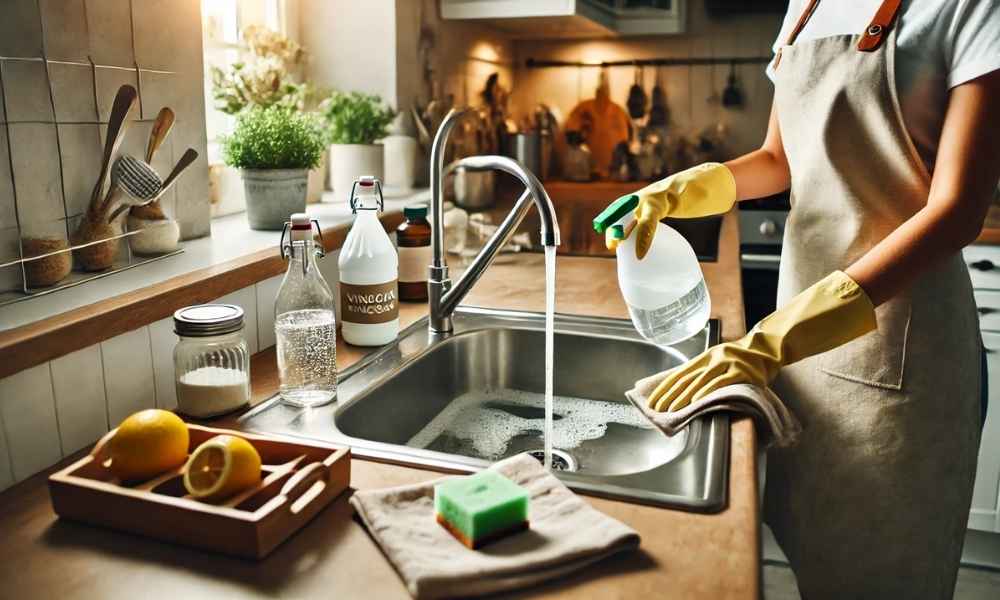The kitchen sink is mostly a battlefield of cleanliness and infection. It’s not just wherein we wash dishes; it’s a gathering floor for bacteria, grease, and debris. As the silent epicenter of culinary interest, your sink endures meals remnants, oils, and a regular barrage of microbes. Keeping it smooth is crucial. Many attain for bleach—a harsh and amazing solution—believing it’s the most effective manner to sanitize. However, bleach isn’t handiest corrosive but additionally dangerous to the environment and fitness. So, how do you disinfect your kitchen sink without bleach? Let’s find gentle, natural options which are effective and safe for both your circle of relatives and the planet.
Understanding Why Sinks Need Regular Disinfection
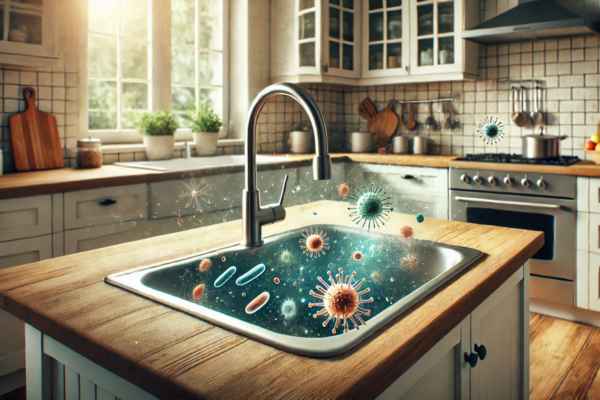
At first look, your sink may additionally appear spotless, but hidden underneath that gleaming surface are colonies of micro organism. Moisture, food particles, and grease create a great surroundings for pathogens like E. Coli and salmonella. The steady publicity to raw ingredients, dirty utensils, and even fingers introduces dangerous bacteria that could quick unfold. These microorganisms can latch onto some thing that touches the sink, contaminating your kitchen and growing the threat of infection. Regular disinfection is critical, now not just for aesthetics however for the fitness and safety of absolutely everyone within the household.
Why You Should Avoid Using Bleach
Bleach has earned its popularity as a cross-to purifier, but at what cost? The fumes alone are enough to irritate your lungs, eyes, and pores and skin. In constrained areas like kitchens, the chance is even greater. Bleach might also give the impact of being a powerful disinfectant, but over the years, it erodes the finish on your sink—specifically if it’s chrome steel or ceramic. Beyond the immediate fitness worries, bleach is infamous for contributing to water pollution, harming aquatic ecosystems when it washes down the drain. Opting for herbal disinfectants isn’t just a choice—it’s a more fit, smarter manner to easy your house at the same time as protective the surroundings.
Natural Disinfectants: A Green Approach to Cleaning
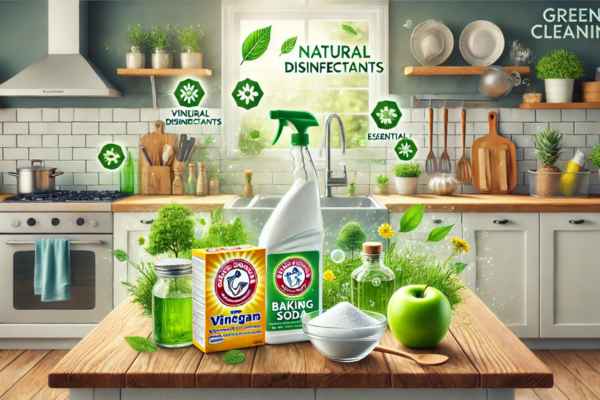
Mother Nature presents the whole thing we need to hold a clean, germ-free kitchen. Natural elements like vinegar, baking soda, and important oils offer powerful disinfecting homes without the risks of harsh chemicals. These agents paintings in concord with the surroundings, killing micro organism, casting off dirt, and leaving your sink smelling clean—all without toxic residue. Switching to green cleansing techniques now not most effective facilitates preserve the planet but also enhances the safety of your property. Why disclose your self to bleach when nature offers such amazing options?
The Essential Tools and Supplies for Natural Disinfection
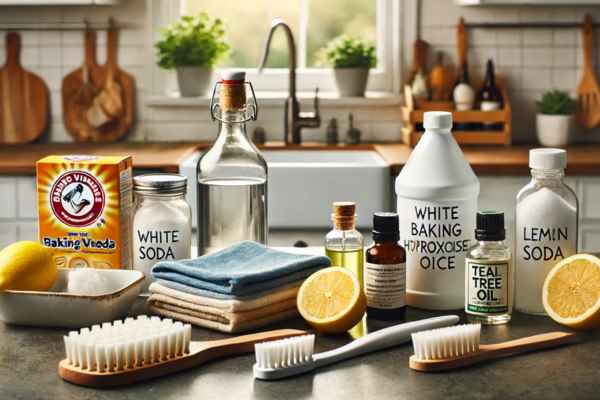
Disinfecting your kitchen sink with out bleach doesn’t require fancy equipment or pricey merchandise. All you need are common family gadgets: white vinegar, baking soda, lemon juice, hydrogen peroxide, tea tree oil, and castile cleaning soap. Combine these with easy tools like a microfiber cloth, an antique toothbrush, and a sprig bottle, and you’ve the whole lot you want to convert your sink into a sanitized sanctuary. It’s time to swap those chemical-laden cleaners for gentler, natural alternatives that get the job done without compromise.
Vinegar: The Kitchen’s Secret Weapon
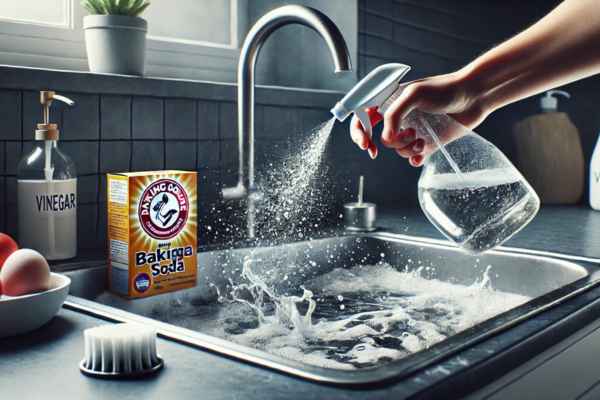
Vinegar can also appear unassuming, but its acetic acid content makes it a powerful disinfectant. The acid efficiently breaks down dust and bacteria, making it perfect for kitchen surfaces. To disinfect your sink, certainly spray undiluted vinegar without delay onto the surface and allow it take a seat for 10-15 mins. The acid works to dismantle harmful microbes, leaving your sink easy and scent-loose. For a fair stronger cleaning answer, blend vinegar with baking soda—a mixture that fizzes and bubbles, breaking down meals particles and casting off stubborn residue.
Baking Soda: The Gentle Scrubbing Hero
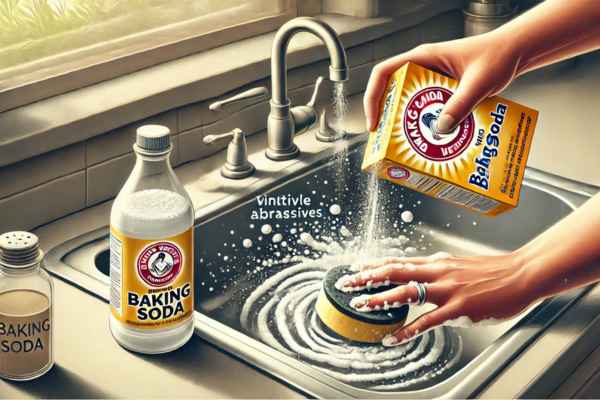
Baking soda is a soft but effective abrasive that works wonders on stains and dirt with out scratching your sink’s surface. Sprinkle it generously over the wet floor of your sink, scrubbing in round motions with a sponge or fabric. The moderate abrasiveness lifts meals particles and neutralizes odors, leaving your sink sparkling and clean. For brought disinfecting energy, pour a dash of vinegar on top, looking as the two elements react. This fizzing motion is not simplest fulfilling but also tremendously effective at breaking down tough spots.
The Magic of Lemon for Disinfection and Freshness
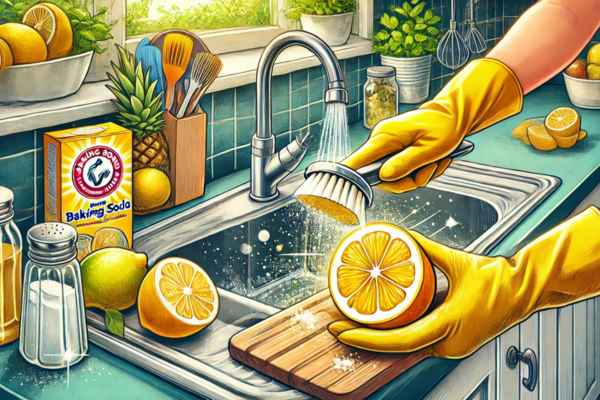
There’s something undeniably refreshing approximately the scent of lemon, however did you recognize its antibacterial homes make it a natural disinfectant too? Cut a lemon in 1/2, sprinkle it with baking soda, and use it as a scrubbing device. The citric acid cuts via grease and dirt whilst the lemon’s herbal oils polish the floor, leaving your sink shining. Plus, the bright citrus aroma lingers lengthy after the cleaning is achieved, giving your kitchen a rejuvenating elevate.
Hydrogen Peroxide: A Safe and Effective Disinfectant
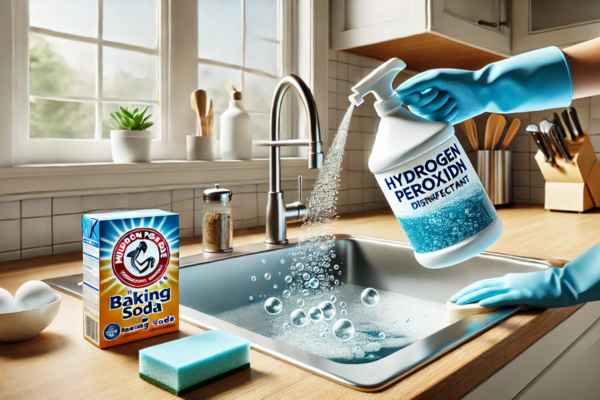
Hydrogen peroxide is another great alternative to bleach. Known for its potential to kill bacteria, it’s gentle enough for everyday use. Spray or pour hydrogen peroxide without delay onto your sink, permitting it to take a seat for approximately 10 mins. This offers the peroxide time to work its magic, breaking down harmful germs. For more difficult stains, integrate it with baking soda to create a thick paste that scrubs away filth. The result? A sink that’s now not just clean but sanitized on the microbial degree.
Tea Tree Oil: Nature’s Antimicrobial Solution
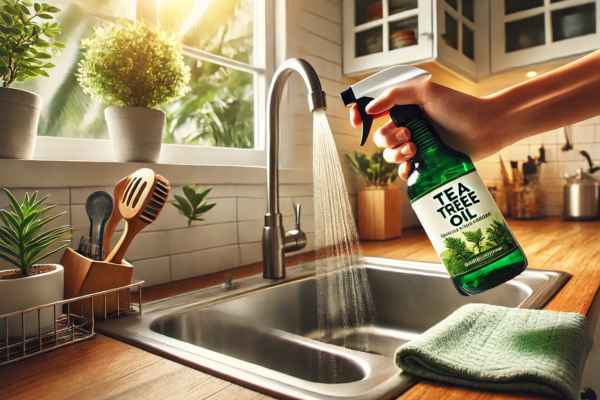
Tea tree oil, with its mighty antifungal and antimicrobial houses, is a super natural disinfectant. To create a tea tree oil spray, blend some drops of the oil with water in a spray bottle. Generously practice this approach to your sink, permitting it to sit down for several minutes. Tea tree oil’s herbal cleaning energy, mixed with its fresh, herbal scent, will depart your sink sanitized and smelling crisp. This is a perfect answer for people who searching for a natural however powerful disinfectant.
Castile Soap for a Gentle and Safe Clean
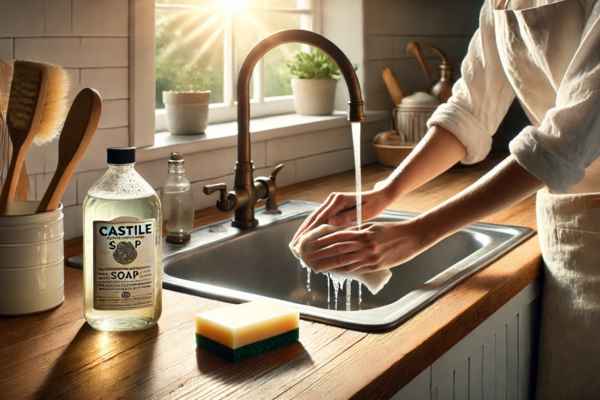
Castile cleaning soap, made absolutely from vegetable oils, is a versatile cleaning powerhouse. It’s gentle, biodegradable, and absolutely non-toxic. To easy your sink, truly blend some drops of castile soap with heat water and scrub using a sponge or fabric. Castile cleaning soap cuts via grease with out harming your sink’s surface, making it a tremendous option for normal cleansing. For an extra disinfecting punch, observe up with a vinegar rinse, making sure your sink remains glowing clean and germ-loose.
DIY Natural Sink Disinfectant Recipes
Crafting your own disinfectant sprays at home is each value-effective and pleasing. A easy recipe consists of mixing equal components water and vinegar with some drops of your favorite vital oil for fragrance. Another involves growing a paste of baking soda, lemon juice, and water for scrubbing away cussed spots. For an antimicrobial improve, upload some drops of tea tree or eucalyptus oil on your aggregate. These DIY solutions aren’t most effective clean to make however also free of dangerous chemical compounds, supplying you with peace of mind even as cleansing.
How Often Should You Disinfect Your Kitchen Sink?
While the frequency of disinfection relies upon on the amount of use your kitchen sink sees, it’s wise to disinfect at the least once every week. For folks that cook dinner regularly, specially with uncooked meat or rooster, it’s first-rate to disinfect immediately after each use to save you bacteria from spreading. Odors, visible dirt, and frequent use are clear signs your sink should gain from greater common disinfection. Regular care ensures your sink remains a safe and hygienic a part of your home.
Cleaning the Sink Drain and Disposal Without Bleach
The drain and rubbish disposal are often overlooked on the subject of cleansing, but they harbor simply as many germs. To tackle those areas, pour a mixture of vinegar and baking soda down the drain, accompanied through warm water. For the garbage disposal, toss in a few lemon peels and run the disposal with cold water. These simple steps make sure your entire sink device stays sparkling and free of bacteria, all without the want for bleach.
Maintaining a Stain-Free Sink
Stains can detract from the cleanliness of your kitchen, but natural cleaners can save you and take away them quite simply. For stainless steel, a paste of baking soda and water is perfect for lifting stains without scratching. Porcelain sinks benefit from a aggregate of lemon juice and salt—a herbal bleach opportunity that brightens the surface. By frequently the use of those mild, herbal techniques, you may preserve your sink spotless and shining.
Common Mistakes to Avoid When Disinfecting Without Bleach
Using natural cleansing agents, positive errors can lessen their effectiveness. One commonplace misstep is not giving natural disinfectants enough time to paintings—vinegar and hydrogen peroxide want time to kill bacteria. Another is excessive scrubbing, that could damage sink surfaces. Always comply with up with a thorough rinse to cast off any residue. Avoiding these commonplace pitfalls will ensure your sink remains as clean and germ-free as feasible.
Using Natural Disinfectants Safely
Natural disinfectants are far safer than chemical ones, but it’s nevertheless vital to handle them effectively. Always label and store selfmade solutions in child-evidence packing containers, and never blend incompatible substances. For example, keep away from combining vinegar with hydrogen peroxide or castile soap, as this will neutralize their effectiveness or motive dangerous reactions. By following those tips, you’ll make sure your kitchen remains a toxin-unfastened region.
The Environmental Benefits of Non-Bleach Cleaning
The environmental effect of cleaning merchandise can’t be overstated. By deciding on natural disinfectants, you’re lowering the chemical load in your private home and lessening your contribution to water pollutants. Vinegar, baking soda, and important oils ruin down without problems within the water system, inflicting no harm to wildlife or ecosystems. In contrast, chemical cleaners like bleach pose sizeable dangers. A switch to inexperienced cleansing strategies makes a big difference in protective the planet, one sink at a time.
Cost-Effective Cleaning: Saving Money with Natural Disinfectants
One of the most compelling reasons to pick natural disinfectants is the cost financial savings. Vinegar, baking soda, and lemons are all especially cheap and can be used in multiple ways around the house. Instead of buying expensive chemical cleaners, you could make your very own solutions at a fraction of the cost. Not only do you keep cash, but you also gain the pleasure of understanding that your property is easy, safe, and unfastened from toxins.
Final Thoughts: A Cleaner, Safer Kitchen Sink Without Bleach
Disinfecting your kitchen sink with out bleach is not handiest feasible but also relatively powerful. With ingredients like vinegar, baking soda, and lemon, you could keep a easy, germ-unfastened kitchen while protective your fitness and the surroundings. The natural options outlined on this manual provide a safer, greener way to preserve your own home glowing easy. By adopting those methods, you’re no longer simply cleaning your sink—you’re making a desire for a more healthy home and a extra sustainable planet.
Encouraging Call to Action
Now is the perfect time to switch to natural cleaning methods. These simple, effective techniques will help you disinfect your kitchen sink without bleach, offering peace of mind while supporting a greener lifestyle. Share these eco-friendly tips with friends and family and inspire them to embrace a healthier, more sustainable approach to cleaning!
